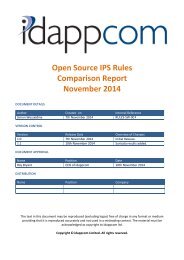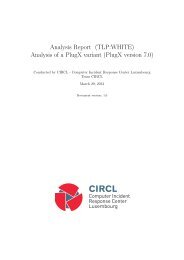The use of the Internet
The use of the Internet
The use of the Internet
You also want an ePaper? Increase the reach of your titles
YUMPU automatically turns print PDFs into web optimized ePapers that Google loves.
102<br />
THE USE OF THE INTERNET FOR TERRORIST PURPOSES<br />
measures against terrorism, in conformity with international law, including international<br />
human rights and humanitarian law. In addition to incorporating this fundamental<br />
principal at a political level, <strong>the</strong> United Nations, through its Special Rapporteur on <strong>the</strong><br />
promotion and protection <strong>of</strong> human rights and fundamental freedoms while countering<br />
terrorism, regularly reports to <strong>the</strong> Human Rights Council and to <strong>the</strong> General Assembly<br />
on areas <strong>of</strong> concern related to <strong>the</strong> human rights aspects <strong>of</strong> criminal justice measures<br />
targeting terrorism and makes recommendations for remedial action by relevant actors.<br />
Issues raised by <strong>the</strong> Special Rapporteur have included those related to <strong>the</strong> detention<br />
and charging <strong>of</strong> suspects. 158<br />
341. <strong>The</strong>re are several publications dealing specifically with, and aimed at, promoting<br />
respect for human rights and <strong>the</strong> rule <strong>of</strong> law within <strong>the</strong> remit <strong>of</strong> prosecutors and criminal<br />
justice <strong>of</strong>ficers involved in terrorism prosecutions. In 2003 <strong>the</strong> Office <strong>of</strong> <strong>the</strong> United<br />
Nations High Commissioner for Human Rights produced <strong>the</strong> Digest <strong>of</strong> Jurisprudence <strong>of</strong><br />
<strong>the</strong> United Nations and Regional Organizations on <strong>the</strong> Protection <strong>of</strong> Human Rights while<br />
Countering Terrorism. Within <strong>the</strong> Council <strong>of</strong> Europe, which has fully recognized and<br />
integrated <strong>the</strong> obligation to implement <strong>the</strong> protection <strong>of</strong> human rights as a fundamental<br />
principle into its instruments dealing with crime prevention and criminal justice issues,<br />
including terrorism, this principle is reaffirmed in <strong>the</strong> Guidelines <strong>of</strong> <strong>the</strong> Committee <strong>of</strong><br />
Ministers <strong>of</strong> <strong>the</strong> Council <strong>of</strong> Europe on Human Rights and <strong>the</strong> Fight against Terrorism,<br />
adopted by <strong>the</strong> Committee <strong>of</strong> Ministers on 11 July 2002. 159 <strong>The</strong>se documents provide<br />
valuable guidance for prosecutors working in <strong>the</strong> counter-terrorism field.<br />
C. Role <strong>of</strong> prosecutors in terrorism cases<br />
342. <strong>The</strong> role <strong>of</strong> <strong>the</strong> prosecutor in <strong>the</strong> conduct <strong>of</strong> criminal proceedings, including<br />
terrorism cases, varies between countries. In some countries, particularly civil-law jurisdictions,<br />
prosecutors have formal responsibility for overseeing <strong>the</strong> conduct <strong>of</strong> criminal<br />
investigations, supervising teams <strong>of</strong> investigators throughout, making decisions on search<br />
and surveillance activities and <strong>the</strong> laying <strong>of</strong> charges or indictments and dealing with<br />
international cooperation issues and <strong>the</strong> conduct <strong>of</strong> proceedings before <strong>the</strong> courts.<br />
343. In an inquisitorial judicial system like <strong>the</strong> French one, for example, <strong>the</strong> prosecutor<br />
is generally tasked with beginning <strong>the</strong> legal action and with initiating preliminary<br />
investigations, defining <strong>the</strong> scope <strong>of</strong> <strong>the</strong> crimes; however, an examining judge, or juge<br />
d’instruction, will lead <strong>the</strong> formal judicial investigation, collecting and examining evidence.<br />
When <strong>the</strong> culpability <strong>of</strong> <strong>the</strong> subject can be excluded, <strong>the</strong> examining judge will<br />
close proceedings; o<strong>the</strong>rwise, <strong>the</strong> subject will be committed for trial before a different<br />
judge. In terrorism cases, in addition to presenting <strong>the</strong> prosecution case to a judge, <strong>the</strong><br />
chief prosecutor may petition or submit a motion for fur<strong>the</strong>r investigation.<br />
158 Ibid.<br />
159 Any text created within <strong>the</strong> Council <strong>of</strong> Europe, irrespective <strong>of</strong> whe<strong>the</strong>r it is a binding convention or a “s<strong>of</strong>t law”<br />
instrument, such as a recommendation or resolution issued by <strong>the</strong> Parliamentary Assembly or <strong>the</strong> Committee <strong>of</strong><br />
Ministers, including any guidelines on various topics, must always be in compliance with <strong>the</strong> extensive case law <strong>of</strong> <strong>the</strong><br />
European Court <strong>of</strong> Human Rights on <strong>the</strong> respective issue.







